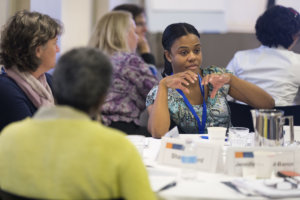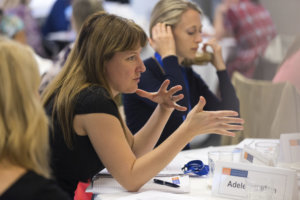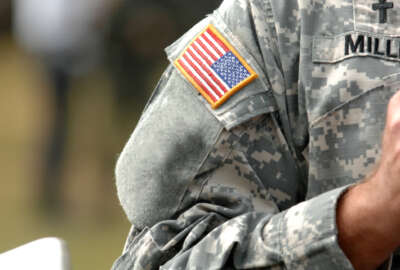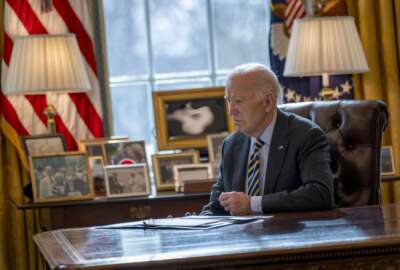
Insight By WashU At Brookings
Cohort-based women’s leadership program fosters inclusive network along with executive training
Women are underrepresented at the top levels of leadership in most industries, not least of which is the federal government.
This content is sponsored by WashU at Brookings.
The recent resurgence of feminism in mainstream discourse has shone a spotlight on many of the institutional obstacles faced by women in many different industries. But there’s another side to that coin, one that gets far less attention: the need for development and training specifically for professional women.

Women are underrepresented at the top levels of leadership in most industries, not least of which is the federal government, said Kelly Bean, senior associate dean and distinguished director of Executive Education at WashU at Brookings. She sees a need for helping women grow, building them up so that they can become part of the slate of candidates reviewed for these jobs. That frequently involves providing opportunities and mentorships that come more easily to men in similar positions.
That’s where the WashU at Brookings Women’s Leadership Program comes into play.
It’s a cohort-based curriculum of eight days of learning spread out over four sessions, each focused around a different facet of leadership:
- Resonant Leadership – a deep dive into self-awareness and emotional intelligence.
- Negotiating for Success – an opportunity to try different negotiating styles and learn about the biases that can exist around negotiation.
- Thriving Through Change – understanding change management and building resilience in leading organizational change.
- Executive Presence – building confidence, presentation skills, and otherwise communicating the part of an executive leader.
None of these courses relies solely on lecture; the curriculum is built on workshops, exercises, feedback, knowledge sharing and case studies. It’s all experiential.
“You’re rolling up your sleeves and digging into the content, and constantly reflecting back on who you are as a leader, and who do you want to be, and how do you want to grow,” Bean said.

And the fact that it’s cohort-based means the same group of 35 professional women from across government and the military will complete the curriculum together, gaining mentors, building a peer network and building trust that facilitates honest feedback and support.
“So they become peer coaches for each other,” Bean said. “There might be areas of their leadership that they’re trying to gain more self-awareness on and maybe, for example, it’s listening and contributing, when maybe they are experiencing that they’re being interrupted by others in a meeting, and maybe one of their peers figured out a way, or has success with how to manage that? So they’re able to share with each other and work together as a class and as a cohort to help propel themselves into the next role.”
And that’s actually the biggest not-so-hidden benefit of this program: the networking. Peer networks and mentors can help insert themselves into situations where biases exist, and work to overcome them through support.
“I would say that the benefit of all of our classes, and this is even more true with our Women’s Leadership Program than for our other cohort programs, is that interagency networking,” said Emily Howard, WashU at Brookings’ Leadership Programs coordinator. “I was actually just looking at an evaluation from last week where somebody said ‘it’s really nice to know that other agencies are having the same problems I have.’”
Theresa Sanchez, director of readiness and talent management for Intelligence, Surveillance and Reconnaissance at USAF Headquarters and alumna of the WashU program, said the executive leadership training is great, but one of the greatest values to her was the generational diversity. She said hearing firsthand the experiences and concerns of women at the beginning and middle stages of their careers helped her to become a better leader.
“I think sometimes we get too stuck on executive training,” Sanchez said. “And I think that isolates the executives in places where it becomes similar groupthink, because we’re of a generation we’ve came up a certain way, it doesn’t really enable that open dialogue that you start to have when you are meeting with classmates on a more regular basis. People may not share the first seminar, but the second seminar, much more open, people are more comfortable, they feel open to be a little bit more vulnerable. And that’s where you really gain the insights.”

And that second-seminar comfort and vulnerability is exactly the environment WashU is striving for with this program.
“What I’ve seen is that they’re looking for is psychological safety, in a place where they can really express difficulties that they’ve experienced as women in government in a safe space,” said Jessika Portney, manager of Leadership Programs at WashU at Brookings.
The whole program is based on research that demonstrates that when women support each other in peer networking and mentoring roles, they’re more able to accelerate their careers into higher level roles.
“There’s a real camaraderie that’s formed around just knowing that you’re not alone,” Howard said.
WashU at Brookings’ next Women’s Leadership session starts in March. For details, visit https://washuatbrookings.org/.
Copyright © 2025 Federal News Network. All rights reserved. This website is not intended for users located within the European Economic Area.
Related Stories




